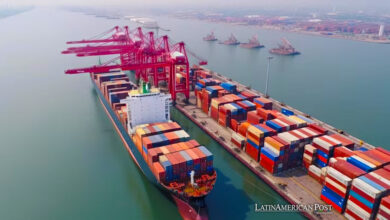China Refutes Costa Rica’s 5G Concerns Amidst Growing Tech Tensions
Costa Rica's decision to exclude Huawei from its 5G network development, citing cybersecurity risks, has sparked a diplomatic row with China. The dispute underscores broader global concerns about data security and international technological collaborations.

Photo: Unsplash
The Latin American Post Staff
Escucha este artículo
Leer en español: China refuta las preocupaciones de Costa Rica sobre 5G en medio de crecientes tensiones tecnológicas
Tension Escalates: Costa Rica Blocks Huawei from 5G Development
global landscape of technological advancement and cybersecurity is witnessing a new chapter of tension between Costa Rica and China. At the heart of this dispute is Costa Rica's decision to bar Chinese tech giant Huawei from participating in developing its 5G mobile data network, citing cybersecurity and espionage concerns. This move has ignited a forceful rebuttal from China, raising questions about international trust and technological sovereignty.
Costa Rican President Rodrigo Chaves has firmly positioned national security as the cornerstone of his administration's technology policy. Chaves's stance stems from concerns about the legal framework governing Chinese companies, particularly regarding the obligation to share information with their government. "The country where Huawei is based doesn't have a solid judicial framework that prevents spying," Chaves stated, highlighting the crux of Costa Rica's apprehension.
China's Denial and Defense of Huawei
China, represented by its embassy in San Jose, has vehemently denied these allegations, describing them as baseless and lacking reason. This sharp response from the embassy defends Huawei's credibility. It reflects the Asian giant's sensitivity towards global perceptions of its technology sector. China, as the world's second-largest economy, has increasingly faced scrutiny over its technology firms' international operations.
The backdrop to this tension can be traced back to the summer when concerns were first raised by a senior U.S. military official questioning Huawei's suitability for 5G development. Following this, Chaves signed a decree in August that effectively banned companies from nations not party to an international cybercrime convention from participating in Costa Rica's 5G development. This decree broadened the ban's scope to include tech firms from countries like China, South Korea, Russia, and Brazil.
Huawei's Predicament in Costa Rica
Huawei, a key player in Costa Rica's telecommunications sector, currently provides various services to the government. It is awaiting a ruling from the country's constitutional court on whether it is being discriminated against due to its Chinese origins. The company's predicament in Costa Rica is a microcosm of the more considerable global debate around the security implications of integrating Chinese technology into critical infrastructure.
China's embassy, in its statement, categorically rejected any criminal wrongdoing on the part of Chinese companies and opposed the politicization of scientific and technological issues. This stance indicates China's broader frustration with what it perceives as a Western-led narrative that unfairly targets its tech firms.
The unfolding dispute has implications beyond technological collaborations; it risks unsettling the diplomatic relationship between China and Costa Rica. In 2007, Costa Rica became the first Central American nation to formally recognize Beijing, a move seen as a significant diplomatic shift in the region. The current controversy, therefore, is not just about 5G technology but also about the delicate balance of international relations.
Navigating the Complex Interplay
This dispute's core is how nations navigate the complex interplay between technological advancement, cybersecurity, and international partnerships. Costa Rica's decision reflects a growing global trend where countries are increasingly scrutinizing the cybersecurity implications of foreign technology, especially regarding critical infrastructure like 5G networks. These decisions are often influenced by broader geopolitical dynamics and national security priorities.
The case of Costa Rica and China also highlights the challenges smaller nations face in asserting their technological sovereignty under pressure from global powers. As countries worldwide grapple with the risks and rewards of adopting advanced technologies, decisions like Costa Rica's shed light on the need for a balanced approach that considers security and international cooperation.
Also read: Dominican Foreign Minister Insists that to Dialogue with Haiti, Canal Works Must be stopped
As the world increasingly becomes interconnected through technology, the issue of trust in international tech partnerships becomes paramount. The Costa Rica-China dispute over Huawei reflects this global dilemma, where the interplay of technology, law, and international relations creates complex scenarios for nations to navigate.
The resolution of this dispute will not only impact the future of 5G technology in Costa Rica but also set a precedent for how countries around the world address similar concerns. How Costa Rica and China will navigate this diplomatic impasse remains to be seen. Still, one thing is clear: the outcome will have far-reaching implications for the global discourse on cybersecurity, technological sovereignty, and international collaboration in the digital age.




